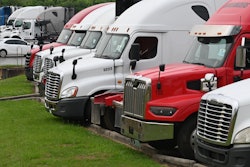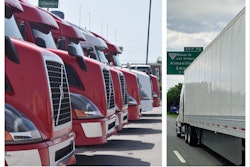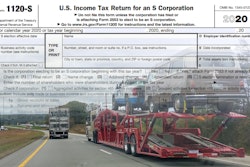Among the biggest challenges for a new business owner is understanding how you are taxed. This is an area where many new and even established owner-operators run into problems. You can avoid any big surprises on April 15 by using good planning and recordkeeping throughout the year.
As an owner-operator, you now are responsible for paying your taxes yourself and calculating the net profit for your business. For anyone who was a company employee, this is a major change. It was your employer’s responsibility to deduct all required taxes from your paycheck, which then were reported on the W-2 you received in January of the following year.
Now you will receive a Form 1099 NEC, which shows the gross earnings your carrier reported to the Internal Revenue Service. Your weekly settlement statements and receipts provide the explanations for the deductions that will help you arrive at your net pay. If you examine the weekly net pay of a typical company driver, you might conclude that owner-operators make more than twice the money. But no taxes are deducted from owner-operators’ settlement sheets or payments from brokers and shippers, to say nothing of expenses.
Furthermore, owner-operators do have to pay the same taxes as the company employee, plus the employer’s share of the Social Security and Medicare taxes. As an employee, only 50% of these taxes were deducted from your pay, but as an owner-operator, 100% of these, known as self-employment taxes, must be paid on the net profit of your business. Owner-operators do technically get a deduction for approximately 50% of the self-employment tax, which is the employer’s portion. Yet deductions are not dollar-for-dollar reductions in tax due, so the owner-operator needs to prepare for self-employment tax.

Both are paid when you file Form 1040 after the end of the year, but estimated tax payments must be made each quarter. They’re often 20% to 30% of the net income received over the quarter. Complying with the quarterly-filing regulation not only avoids a penalty, it also eliminates any surprise of a huge tax bill as April 15 approaches.
Defining the various types of taxes you'll be liable for
Self-employment taxes. As noted above, these are equivalent to Social Security and Medicare withholdings paid through a company for employees. For 2025, rates are unchanged from 2024 at 15.3%. This is made up of 12.4% Social Security tax and 2.9% Medicare tax.
Federal and state income tax. This is calculated on your tax return. As a company employee, this amount was estimated and withheld from your check. As an owner-operator, you are responsible for its estimation and payment.
Estimated tax payments. Those who expect to owe at least $1,000 in tax after subtracting withholding and credits are required to make quarterly payments of self-employment taxes and federal and state income taxes. Though the IRS allows estimates based on the prior year’s data, owner-operator financial service provider ATBS uses current data to compute estimated taxes due.
Find payment vouchers and addresses for IRS estimated payments, as well as other federal tax information, at the IRS website. Each state that imposes income taxes has a website to obtain their payment vouchers and addresses.
If you make a late payment to the IRS, or no payment, it is authorized to apply penalties and interest based on the amount of tax due.
[Related: Should I pay my quarterly taxes or pay off my truck?]
Deductions and the importance of recordkeeping
Owner-operators’ estimation of expected profit is used not only for estimated tax payments, but also for calculating the taxes due after the end of the year when the Form 1040 is filed. The profit equation you should use:
- ALLOWABLE BUSINESS EXPENSES
= NET PROFIT
If you fail to show deductions or file a tax return, the IRS will determine the taxes that are due based on their estimate of your income from 1099s provided by your business partners and not consider your deductions/expenses. This amount certainly will be much higher than what you otherwise would have been required to pay.
As an owner-operator, you have many deductible expenses. The main criteria in determining deductibility are whether you have a record of the expense and whether it is an ordinary and necessary business expense. Other than honesty, the best protection from audits and penalties is good recordkeeping. Keep all records that support every deduction you claim on your tax return, beginning with your logbook for those per diem deductions.
With electronic logs, make sure you download your records every month or so for tax purposes. A leasing carrier is not likely to keep them beyond the six-month time period required for compliance.
Save and label expense receipts, maintain an expense log or spreadsheet, and sort it all at the end of every run. A receipt is the most obvious evidence of a deductible purchase, but you also can use canceled checks, bills, credit card statements, invoices, an expense notebook -- anything showing when, where and what you bought and how much you paid.
Don’t be too quick to label expenses “miscellaneous,” either; the more specific you are, the better.
Don’t forget to collect receipts for lumper fees or any expenses automatically charged to your credit card such as tolls, scales and credit card fees. Many owner-operators maintain separate credit cards for business and personal use just to simplify keeping track of such expenses.
Don’t overspend on supplies, equipment and services in your zeal to accumulate deductions. Only a portion of those expenses will be recouped through your tax filing. IRS Publication 552 goes into aspects of keeping records you might not have considered, such as the kinds of records to keep and how long to keep them.
2025's tax calendar
Individual tax returns: original due date -- April 15
Filing extension due -- April 15 (extends to Oct. 15)
Estimated tax payments due dates:
1st quarter -- April 15
2nd quarter -- June 16
3rd quarter -- Sept. 15
4th quarter -- Jan. 15
Federal Highway Use Tax -- Aug. 31 ($550)
Read next: The owner-operator's role in tax preparation: More than just bookkeeping









